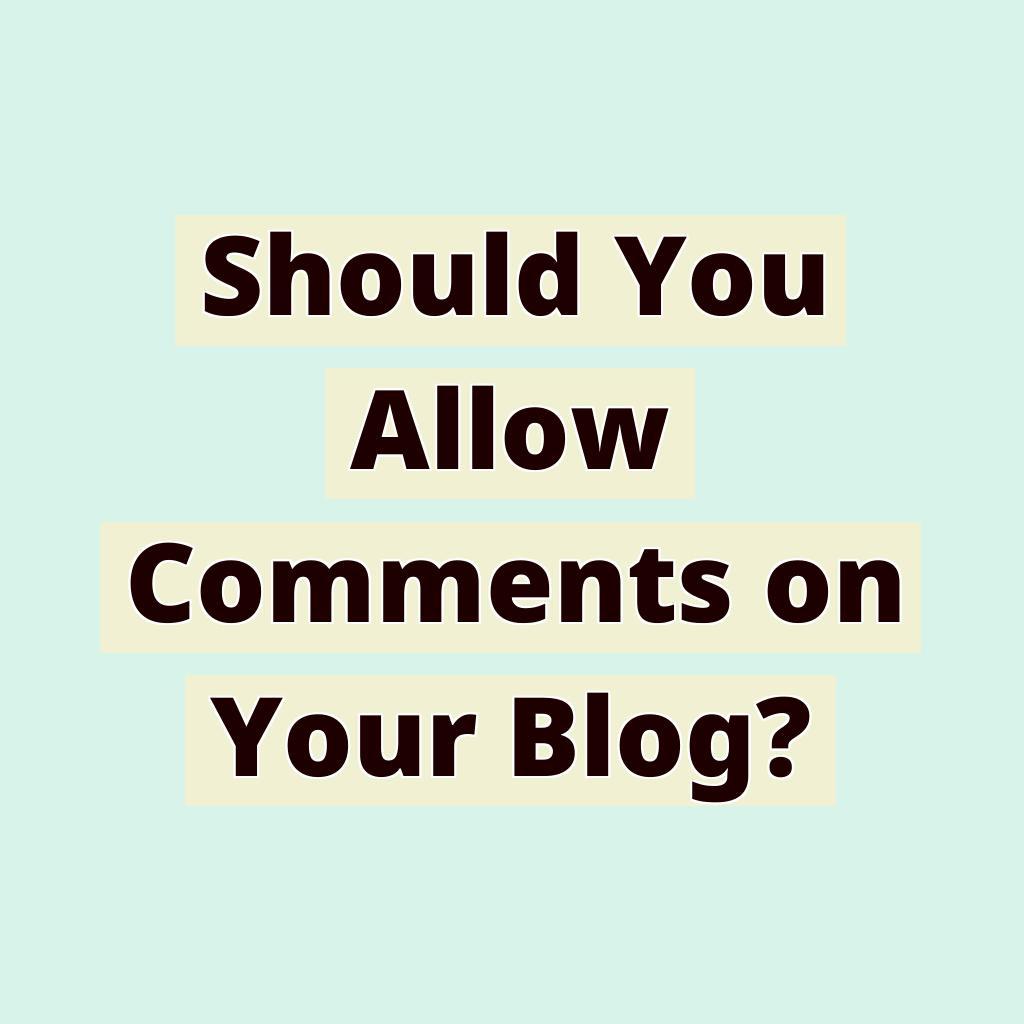In today’s digital age, the concept of blogging has revolutionized the way we share ideas, opinions, and information.
However, one question that often arises is whether or not to allow comments on your blog.
On one hand, comments can foster a sense of community, encourage engagement, and provide valuable feedback.
On the other hand, they can also attract spam, trolls, and negative conversations that may overshadow the positive aspects. Deciding whether to enable comments on your blog is a crucial decision that requires careful consideration of the pros and cons.
In this blog post, we will explore the benefits and drawbacks of allowing comments on your blog, helping you make an informed choice that aligns with your blogging goals and audience engagement strategies.
So, let’s dive in and uncover the factors that can influence your decision.
Why Are Blog Comments Important for SEO?
When it comes to search engine optimization (SEO), blog comments play a crucial role in boosting your website’s visibility and ranking. They serve as a valuable source of user-generated content that search engines love to crawl and index. By allowing comments on your blog, you open the door for an interactive dialogue with your readers, creating a dynamic environment that search engines find appealing.
First and foremost, blog comments provide fresh and relevant content. Search engines constantly crave new information, and by allowing comments, you’re essentially inviting your readers to contribute their thoughts, insights, and questions. This user-generated content not only adds depth and richness to your blog posts, but it also signals to search engines that your website is active and engaging.
As well as this, blog comments can significantly enhance your website’s search rankings through keyword optimization. When readers leave comments, they often use keywords and phrases related to the topic at hand. These keywords, when naturally incorporated into the comment section, can help search engines understand the context and relevance of your content. This, in turn, can boost your website’s visibility in search engine results pages (SERPs) for those specific keywords.
Additionally, blog comments can foster backlink opportunities. When readers engage with your blog and leave comments, they may include a link to their own website or relevant resources. These links act as endorsements or references, indicating to search engines that your content is valuable. The more high-quality backlinks you have, the more authoritative and trustworthy your website appears to search engines, potentially leading to improved search rankings.
Furthermore, blog comments can increase the time spent on your website. Engaging discussions and conversations in the comment section can captivate readers, encouraging them to stay longer on your page. This extended dwell time sends positive signals to search engines, indicating that your content is valuable and engaging, thus potentially improving your search rankings.
Lastly, blog comments contribute to social proof. When readers see active discussions and positive interactions in the comment section, it builds trust and credibility. This social proof can encourage others to join the conversation, share your content, and even link back to your blog, all of which can further enhance your website’s visibility and SEO efforts.
What Are the Benefits of Allowing Comments on Your Blog?
Allowing comments on your blog can be a game-changer for your online presence. Not only do comments create an interactive and engaging environment, but they also offer numerous benefits that can enhance your blog and foster a sense of community among your readers.
First and foremost, comments provide an avenue for direct communication with your audience. They allow readers to share their thoughts, opinions, and experiences related to your blog post. This creates a dialogue between you and your readers, fostering a sense of connection and building trust. By actively responding to comments, you demonstrate your engagement and willingness to listen to your audience.
Comments also offer an opportunity for valuable feedback. When readers leave comments, they may provide insights, suggestions, or even corrections, which can help you refine your content and improve your writing. This feedback loop is invaluable for growth as a blogger and can help you better understand your audience’s needs and preferences.
Alongside this, comments can generate additional content for your blog. When readers engage in discussions, they often bring up related topics or share their personal experiences. This can spark ideas for new blog posts or even inspire collaborations with your readers. By encouraging comments, you’re essentially tapping into a wellspring of ideas and expanding the breadth of your content.
Furthermore, allowing comments can significantly boost your blog’s visibility and reach. When readers leave comments, they may share your blog post on social media platforms or link back to it from their own websites. This not only increases your blog’s exposure but also improves your search engine rankings. Search engines recognize the social signals generated by comments and backlinks, which can lead to higher organic traffic and increased discoverability.
Additionally, comments create a sense of community among your readers. When readers engage with each other and exchange ideas in the comment section, they feel connected to a larger group with shared interests. This community-building aspect not only encourages readers to return to your blog but also increases the likelihood of them sharing your content with their own networks.

How Do Comments Contribute to User Engagement?
Comments play a crucial role in fostering user engagement on your blog. They create a two-way conversation between you and your readers, encouraging active participation and building a sense of community.
When readers leave comments, they feel heard and acknowledged, which in turn motivates them to return to your blog. By responding to their comments, you demonstrate your interest in their thoughts and opinions, further strengthening the connection.
By the same token, comments provide an opportunity for readers to share their own experiences and perspectives, adding depth and diversity to the conversation. This engagement helps create a vibrant and dynamic environment where readers feel valued and are more likely to engage with your content.
Additionally, comments can spark discussions among readers, creating a sense of camaraderie and allowing for the exchange of ideas. This interaction promotes a feeling of inclusivity and involvement, making readers feel like an integral part of the community you’ve built.
Furthermore, comments foster a sense of social proof. When readers see others engaging with your content and leaving positive comments, it builds trust and credibility. This social validation encourages new readers to join the conversation and engage with your blog.
In addition to building a sense of community, comments can also lead to increased time spent on your website. Engaging discussions in the comment section can captivate readers, encouraging them to explore more of your content and stay longer on your blog.
Also, comments can provide valuable feedback and insights from your readers. They may offer suggestions, ask questions, or share their own expertise, which can help you refine your content and cater to your audience’s needs.
Besides this, comments can act as a source of inspiration for future blog posts. Reader comments may spark new ideas, highlight different perspectives, or uncover topics you hadn’t considered before. This feedback loop ensures that your content remains relevant and resonates with your audience.
Should You Moderate Comments on Your Blog?
The decision to moderate comments on your blog can be a contentious one. On one hand, moderation allows you to maintain control over the content and tone of the discussions taking place. On the other hand, it can stifle free expression and discourage readers from engaging. So, should you moderate comments on your blog? Let’s explore the pros and cons.
One of the main benefits of comment moderation is the ability to filter out spam and inappropriate content. By reviewing and approving each comment before it goes live, you can ensure that your blog remains a safe and respectful space for readers. This helps maintain the integrity of your brand and protects your audience from offensive or harmful material.
Moderation also allows you to maintain a certain level of quality and relevance in the comment section. By filtering out irrelevant or low-quality comments, you can create a more meaningful and valuable discussion. This ensures that readers are exposed to thoughtful insights and fosters a positive user experience.
Furthermore, comment moderation can help prevent heated arguments or personal attacks from escalating. By monitoring the comments and stepping in when necessary, you can enforce community guidelines and promote civil discourse. This creates a more inclusive environment where readers feel comfortable expressing their opinions without fear of harassment or hostility.
However, moderation also has its drawbacks. Strict moderation policies can deter readers from leaving comments altogether. If readers feel that their comments will be heavily censored or edited, they may be reluctant to engage in discussions. This can hinder the sense of community and limit the diversity of perspectives on your blog.
Additionally, moderation can be time-consuming and resource-intensive. Reviewing and approving each comment manually can be a tedious task, especially if your blog receives a high volume of comments. This can take away valuable time that could be spent creating new content or engaging with your audience in other ways.
And another thing to keep in mind is that, there is a fine balance between moderation and censorship. While it is important to maintain a respectful environment, overly strict moderation policies can limit freedom of expression. It is essential to find a middle ground where you can allow for open dialogue while still ensuring that the discussions remain civil and constructive.
The Bottom Line: To Enable or Disable Comments on Your Blog?
Deciding whether to allow comments on your blog is a personal choice that depends on your goals and priorities.
If fostering a sense of community, encouraging engagement, and receiving valuable feedback are important to you, enabling comments can be beneficial. However, it requires careful moderation to maintain a respectful and constructive environment.
On the other hand, if you prioritize efficiency, have limited resources, or are concerned about potential negativity, disabling comments may be a viable option. This allows you to focus on creating content without the need for extensive moderation.
Ultimately, consider your audience, the nature of your content, and the resources at your disposal. Striking the right balance between engagement and moderation ensures a positive user experience and contributes to the success of your blog.
